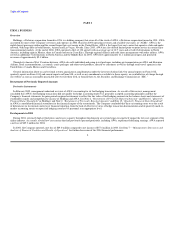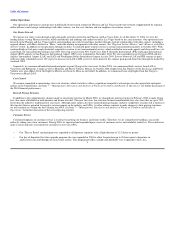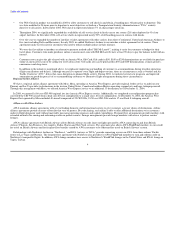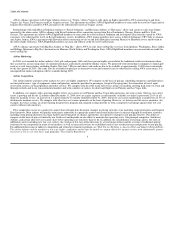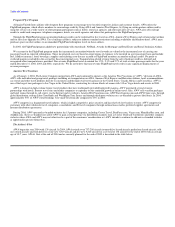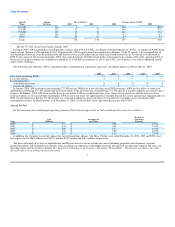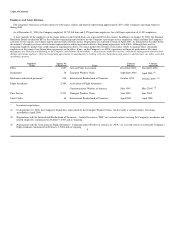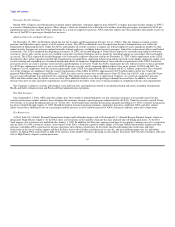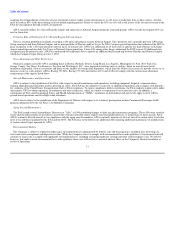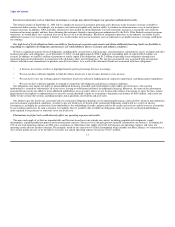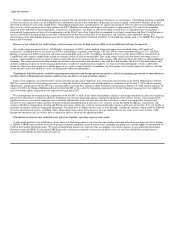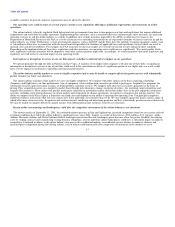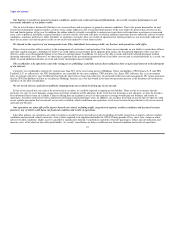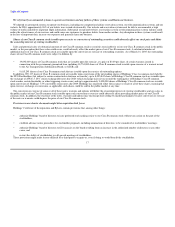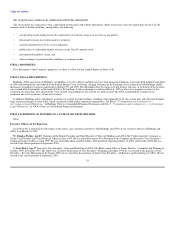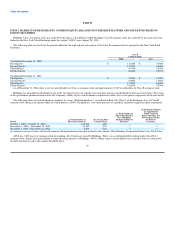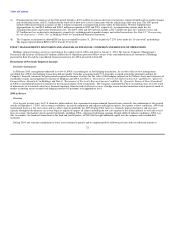US Airways 2004 Annual Report Download - page 15
Download and view the complete annual report
Please find page 15 of the 2004 US Airways annual report below. You can navigate through the pages in the report by either clicking on the pages listed below, or by using the keyword search tool below to find specific information within the annual report.
Table of Contents
The Comprehensive Environmental Response Compensation and Liability Act of 1980, also known as Superfund, and comparable state laws impose
liability without regard to fault on certain classes of persons that may have contributed to the release or threatened release of a "hazardous substance" into the
environment. These persons include the owner or operator of a facility and persons that disposed or arranged for the disposal of hazardous substances. Many
airports in the United States, including Phoenix Sky Harbor International Airport, are the subject of Superfund investigations or state implemented
groundwater investigations. AWA occupies facilities at some of these affected airports and is a member of a fuel-handling consortium that has experienced a
fuel leak into ground water at Phoenix Sky Harbor International Airport. AWA does not believe that its operations have been included within the scope of any
of these investigations and does not believe that its expenses associated with the fuel leak at Phoenix Sky Harbor International Airport will be material.
The trend in environmental regulation is to increasingly place more restrictions and limitations on activities that may affect the environment and we expect
that the costs of compliance will continue to increase.
Other
We are also subject to the jurisdiction of the Federal Communications Commission with respect to the use of radio facilities and the United States Postal
Service with respect to carriage of United States mail.
Risk Factors Relating to the Company and Industry Related Risks
We caution the reader that these risk factors may not be exhaustive. We operate in a continually changing business environment and new risk factors
emerge from time to time. Management cannot predict such new risk factors, nor can it assess the impact, if any, of such new risk factors on our business or
the extent to which any factor or combination of factors may impact our business.
We have sustained, and may continue to sustain significant operating losses.
For the year ended December 31, 2004, we incurred an operating loss of $43.8 million. In addition, we incurred operating losses for the years ended
December 31, 2001 and 2002 resulting primarily from the decrease in revenue and passenger demand and the increase in operating costs after the terrorist
attacks of September 11, 2001. Recently, the operating losses resulted primarily from a substantial increase in the cost of jet fuel and excess domestic industry
capacity resulting in lower revenue per available seat mile. We expect the threat of further terrorist attacks and continued instability in oil producing regions to
continue to negatively impact our revenues and costs in the near-term. We may not be able to effectively counteract increasing costs through our cost
reduction initiatives, customer service initiatives and revised pricing structures. Moreover, our liquidity and borrowing options are limited and we may not be
able to survive a prolonged economic downturn, decreases in demand for air travel or further increases in jet fuel costs. The inability to sustain profitability
may impair our ability to satisfy our obligations as they become due, obtain future equity or debt financing, respond to competitive developments and
otherwise sustain or expand our business.
Global instability, caused by events such as terrorism, has had and may in the future have a material impact on the airline industry and, as a result,
our financial condition, operations and prospects.
Over the past several years, global instability, caused by military action, terrorism, disease outbreaks and natural disasters, has had a profound impact on
the airline industry. The terrorist attacks of September 11, 2001 resulted in a severe strain on our and the other airlines' liquidity as the government
temporarily suspended all flights, passenger demand dropped precipitously and financial institutions tried to reduce their exposure by restricting the industry's
access to capital. In addition, the terrorist attacks led to a decrease in the value of aircraft and aircraft-related equipment and facilities and cost increases for
enhanced security measures, aviation insurance, airport rents and landing fees. Subsequent to the terrorist attacks, other events, such as military action in Iraq
and Afghanistan, general political and economic instability in oil producing regions, and the Severe Acute Respiratory Syndrome or "SARS," outbreak in
Asia, continued to adversely impact passenger demand and operating costs, especially jet fuel costs. These kinds of events (including natural disasters such as
the recent tsunamis in the Indian Ocean) are likely to continue to impact the airline industry. Depending on the severity and geographical impact of such
events, they may have a substantial adverse impact on our passenger demand, our costs, the value of our assets and our access to, and cost of capital. We
cannot predict whether we will have sufficient liquidity or access to capital to withstand the adverse impact of a prolonged decrease in passenger demand or a
substantial increase in costs caused by such global events.
12


